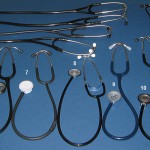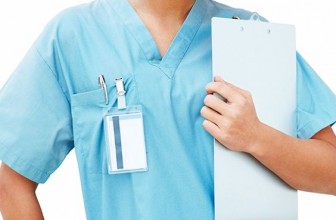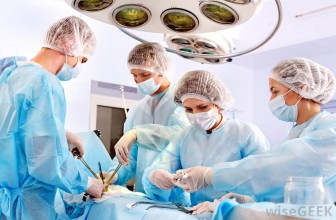
Forensic nurses are trained in collecting medical evidence, forensic photography and they also get to learn all there is to know about the criminal justice system.
After they have attended to the patient’s medical needs, a forensic nurse is expected to collect evidence that is crucial in compiling a medical testimony that they give in the court. The information they collect also help them in consulting legal authorities.
The job of a forensic nurse is detail-oriented in that, much attention is given to details; there is no room for mistakes or misdiagnoses.
They are mostly found in the emergency room since they have to get the first diagnoses of the victim before he/she is taken to surgery for instance. This helps the forensic nurse to be accurate in their assessment of the victim’s condition. It is also important since they are also expected to expound on any of initial sign of foul play.
Forensic nurses also investigate potential cause of incidence of disease and death in large numbers in diverse settings.
Contents:
- What Is a Forensic Nurse?
- How to Become a Forensic Nurse?
- Forensic Nurse Jobs and Salary
- Forensic Examiners
- What Makes a Great Forensic Nurse?
- International Association of Forensic Nurses
What Is a Forensic Nurse?

A forensic nurse is a person who gives care to the sick who are first and foremost trained as nurses, but specialize in patients that are victims or perpetrators in a traumatic situation. They are responsible for more than just medical care, they also identify and assess injuries and record their findings. Moreover, they act as fact witness (the person who witnesses what took place as it happened) or an expert witness (the person that gives their point of view or opinion on what took place) in courts.


Forensic nursing is the latest addition to the American Nurses Association (ANA), which is a body that is made of a group of professionals that specialize in connecting healthcare and the legal system. In simpler terms, they serve as a link between medicine and law. It comprises of usage of nursing education or science in proceedings that are legal. It involves administering health to correctional facilities, providing medical care to victims of assault and examining crime scenes.
How to Become a Forensic Nurse?
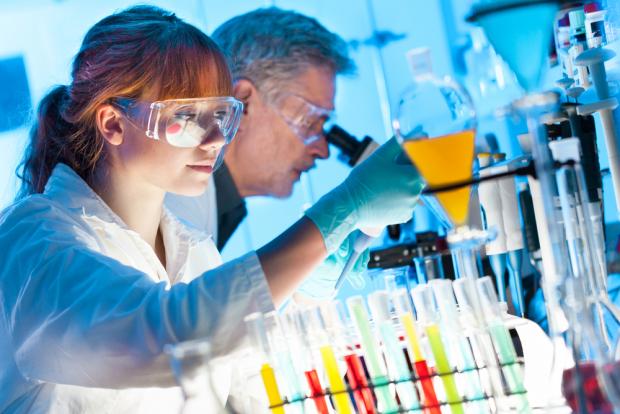
There is much that you should do before you get to the specifics of becoming a forensic nurse.
That is:
- Decide if either an advanced course or a certificate course will meet your career objective.
- Look at all the requirements that your state board of nursing or similar organization sets for forensic nurses.
- Create networks where you get to know different people in different fields. This helps you to get diverse opinions and to even get to connect with people that have already become successful in the field.
Below is a step-to-step detailing of how to become a forensic nurse:
- Get a Bachelor of Science in Nursing Degree
This four-year program prepares the graduate nurses for post- graduate study.
It helps them to get into the workplace with already established skills in clinical assessment, analyzing a situation and critical thinking.
You are obliged to take part in complete rotations in the local medical facility, and you also get to have a clinical experience, which helps in exposing you to various specialties. These include but not limited to:
- Psychiatry
- Obstetrics
- Community health
- Surgical nursing
- Paediatrics
This program is also important since you finish a course work in the following crucial fields:
- Clinical nutrition
- Pharmacology
- Health patterns
- Physical assessment
- Transcultural nursing
- Pathophysiology
- Adult and pediatric health patterns
All these are crucial in making you a qualified forensic nurse, none of what is involved in this program should be taken for granted. This program lays a foundation for your forensic nursing career, which is very important in defining you as a forensic nurse. It also helps to make everything else a little bit easier since it is built of what you learn in this program.
- Earn a Registered Nurse (RN) Credentials
In the U.S. specifically, a forensic nurse has to sit for the National Council of State Boards of Nursing (NCSBN) exam, National Council Licensure Examination (NCLEX). Eligibility goes to any nurse who has graduated from a nursing program that is accredited. Once one passes the exam and meets all other requirements that the states puts out for them, then one can be assigned the license.
- Obtain Post-Baccalaureate Training
A forensic nurse can acquire training by either of the following two options:
- Going through a shortest post-graduate certificate program in forensic nursing — this kind of program is frequently found in nursing schools’ postgraduate departments. This program prepares the registered forensic nurse in the following areas:
- Recognizing abuse and neglect
- Administering inflicted trauma’s clinical investigations
- Learn how to react effectively when faced by disasters
- Injury assessment
- Working together with law enforcers or enforcement
- Completing a 2-year Masters of Science in Nursing (MSN) program with an emphasis on forensic specifically- this graduate program aims at preparing the practicing forensic nurse for forensic clinical roles which include working as the following:
- A nurse coroner
- A consultant in legal nursing
- Forensic psychiatric nurse
- A death investigator
Additionally, when the forensic nurse is done with this program they are expected to have the capability of doing the following:
- Help in legal investigations
- Recognise and help to avoid domestic violence
- Showcase advanced analyzing and documentation skills
- Advocate for health care and safety
- Work effectively and efficiently with and in the legal system

Most Registered Nurses (RN) become more successful forensic nurses by starting out as Sexual Assault Nurse Examiners (SANE). To achieve this, one is obliged to take a Sexual Assault Examiner class, which consists of forty hours training in the classroom plus an average of forty hours clinical training. The International Association of Forensic Nurses (IAFN) offers education guidelines that help one to go about this. It also offers training, whereby if one is a member they get networking opportunities, discussion forums, career resources and access to a forensic nursing journal.
- Employment assurance
Since the introduction of forensic nursing, there has been an immense growth of the job market. Where you find there are a lot of job opportunities for a forensic nurse that will be expounded on later on.
2. Career advancement opportunities
This involves continuing one’s education, which can be done through webinars, seminars, joining the professional organization (IAFN) and taking courses. This also helps the forensic nurse stay current, in that they are aware of what is latest in the field especially changes in law and protocol.
Working as a forensic nurse is a nursing specialty that has just been around for a shorter time compared to other specialties. There are a few programs in the university that are dedicated to forensic nursing. Although, even among the few Cleveland University has topped the list as it offers an all-around forensic nursing program.
In order to be admitted into a forensic nursing program you need to attain or have the following:
- You must be Registered nurse license from the U.S.
- Have a minimum GPA of 3.0 in your Bachelor of Science in Nursing (BSN)
- You must have completed a graduate-level statistics course
- You must present all post-secondary education transcripts
In Cleveland University, they offer different programs to forensic nurses. The student is expected to either complete a thesis, two research, and clinical courses or completing three clinical courses and one research course instead of completing the thesis. Although, if one is aspiring to pursue a PHD later on, option one where you complete the thesis is the wise choice for you. Additionally, one requires a minimum number of 39 hours to graduate.
Their masters of science in forensic nursing program’s curriculum comprises of the following:
- Introduction to forensic nursing
- Nursing of populations 1 & 2 forensics
- Practicum in population health care
- Thesis (optional)
- Theory development in nursing
- The legal system
- Professional role development for population health nursing 2
- Health care policy
- Nursing research methods 1, 2
- Independent study (optional)
- Strategies for population health assessment in forensic nursing.
- Required elective (ethics)
On top of this, there is also a Master’s of Science in Nursing (MSN) – population focus forensic track with/without the thesis is available .The track contains the following courses:
- Introduction to population health nursing
- Nursing research
- The legal system
- Theory development in nursing
- Ethics for advance nursing practice
- Health care policy
- Evidence-based practice
- Introduction to forensic nursing: crisis theory
- Population assessment- 100 clinical hours
- Forensic methodologies
- Population interventions- 100 clinical hours

When the thesis curriculum is not present, the credit hours used for the final thesis is replaced by population-based nursing practicum courses. It involves population health nursing for 200 clinical hours, together with a 200-hour capstone project in population health care.
One of the main factors that should guide you when you are choosing the suitable program is that jobs in forensic nursing are in different settings. Therefore, it is advisable to consider that along with other factors in order to attain your career objectives.
Duquesne University is the other institution with a great forensic program that we will focus on. They have an online and on-campus program that is fully accredited. Their course work is the same as that of Cleveland. To make the online course effective and efficient to the students, they have rigorous assignments that have strict deadlines. Although, the students are able to work together in order to achieve their academic goals and work on solutions together. The faculty also give feedback and one on one advice to the students as they continue on with the program. The advanced technology gives the students a chance to have in-depth discussions and learning principles that are integrative. The students are supervised by clinical preceptors in a clinical setting that is nearby.
Forensic Nurse Jobs and Salary
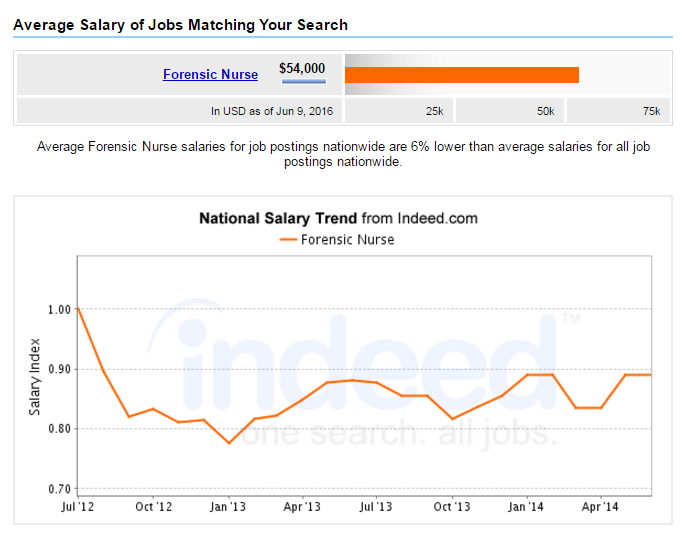
The main question that one asks themselves before they even start pursuing a certain career is how much money will I get paid for this?
It may not be out loud but we all ask it. Even back when you were confused on what you want to become, every career that came up, you always asked how much you would make out of it. Same case goes to forensic nurses; the much that we have said about it is not enough if we leave out the salary part. Well, you don’t have to wonder anymore. In 2010, the Bureau of Labour Statistics (BLS) report did not give an exact figure for forensic nurses. However, averagely registered nurses earning was $64,690 annually in 2010. With the top ten percent earning $95,130 and the other earning $44,190. Most of the forensic nurses fall under the top ten percent, although one has to put in mind that one’s salary is dependent on a number of things like the job location, the forensic nurse’s experience and the cases being handled.

That being said, here are some of the career opportunities for forensic nurses out there mainly for those that have advanced their education. They are:
1) Forensic nurse investigator — they reveal conditions surrounding death that was unexpected or was violent in nature. They work under coroners or medical examiners. They inspect and examine the body, help in doing the autopsy, investigate the scene, gather the deceased’s social and medical history.
2) Legal nurse consultants — they work with attorneys in cases where medicine and law intersect. The forensic nurse has to apply their clinical experience, and what they learned in school to explain and examine information related to medicine. These cases may include personal injury, workmen’s compensation, and medical malpractice. They teach the attorneys medical facts involved in the cases and act as expert witnesses in court.
3) Forensic clinical specialist — these forensic nurses serve as clinicians, consultants, expert teachers, administrator and researcher in various forensic settings. They have doctoral or masters forensic nursing degree making them specialists.
4) Nurse coroners — they are also called death investigators. They must be the first to get to a peculiar death scene, so they can determine the appropriate death time and probably cause of death.
5) Correctional nursing specialist — these forensic nurses administer medical care to individuals that have been detained. Either in a juvenile facility, jail, prison or any other correctional facility.
6) Forensic gerontology specialist — they help to examine and look into cases involving the violation of elders’ rights. They advocate and create awareness on human right issues.
7) Sexual Assault Nurse Examiner (SANE Nurses) — these forensic nurses specialized in forensic nursing education, since they examine injuries, gather and put together the crime’s evidence and comment on the victim’s continued care. They frequently appear in court as the victim’s expert witness. They provide prompt and empathic care to victims of sexual assault.
8) Forensic psychiatric nurses — these forensic nurses give rehabilitative care to offenders with psychological, behavioural and social disorders.
Forensic Examiners

The American Nurses Credentialing Centre gives forensic nurses credentials. This is earned by sending your portfolio and not sitting for an exam, which is peer-viewed by a panel of expert nurses. In the portfolio, you are supposed to present your nursing practice and theory application, specialized skills, and knowledge. It must bring out the following domains:
- Ethical and professional nursing practice
- Professional development
- Safety and quality
- Collaboration and teamwork
The American College of Forensic Examiner Institute also certifies forensic nurses that can collect evidence properly, who understand forensic examination components, and can identify forms of violence. The certification you get improves your reputation as professional and personal accomplishments.
What Makes a Great Forensic Nurse?
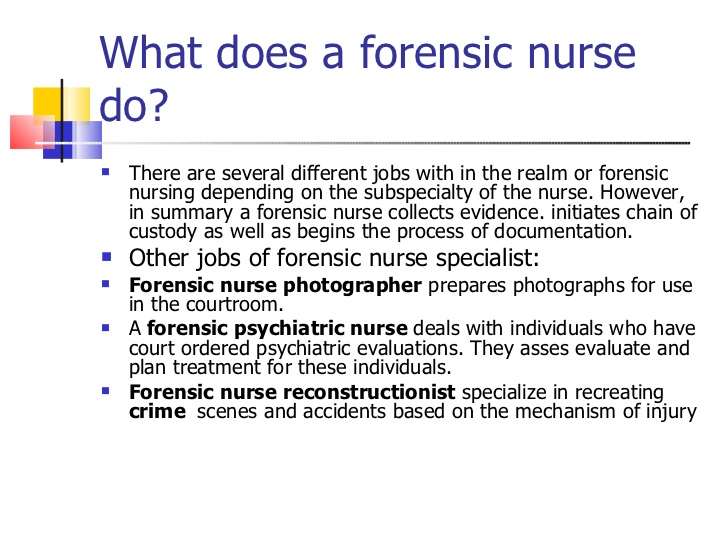

- Attention to details — a forensic nurse has to have an observant eye, meaning he/she should be able to notice when something is going wrong, or when something is off.
- Critical thinking skills — this is a very vital skill that every forensic nurse should possess. It helps them to think fast especially in a crime scene and when doing evidence collection.
- Emotionally stable — a forensic nurse is exposed to situations where the victims are looking up to them for strength. There are surrounded by people that are undergoing traumatic situations that turn their world upside down. Therefore, you have to be collected and put on a calm front. This comforts the victim making evidence collection easier and effective.
- Compassion — the kind of victims the forensic nurse deals with require empathy wherever they can find it. Hence, compassion is an important skill to have in such a setting; it also makes the victim comfortable with you. Compassion also helps you to be patient with the victims especially those that take long to compose themselves.
- Organizational skills — since as a forensic nurse you are collecting evidence, photos, samples, and writing reports, you need to organize it perfectly. Reason being that you need all these when giving your testimony in court. Moreover, professionalism demands that you be in a position to locate all your work whenever it is needed.
- Solid knowledge of criminal proceedings, law, and forensic science — the day to day life of a forensic nurse is spent in the court as much as the hospital. Additionally, you cannot be giving testimonies in the court when you have no knowledge of what goes on there.
International Association of Forensic Nurses

They Have 3000 plus members.
They offer online learning programs and certification.
By establishing a minimum SANE, their eligibility requirement with the commission for forensic nursing certification and accredited nursing programs were aligned together.
For SANE you need 300 clinical hours within the past three years, which involves teaching, being on-call, consulting, patient care and contributing to peer review.
You acquire Sexual Assault Nurse Examiner-Adult/Adolescent (SANE-A) or Paediatric (SANE-P).
Forensic nursing is one of those careers that you need to do a thorough research about before pursuing. This helps to evaluate yourself and determine which direction you will take, and what kind of a forensic you want to become. Visit forensic nurse websites, especially International Association of Forensic Nurses (IAFN), American Forensic Nurses (AFN) and American Nurses Association (ANA). You will learn more about certification as a nurse on top of forensic nurses and suitable accredited nursing programs.
SOURCES:


